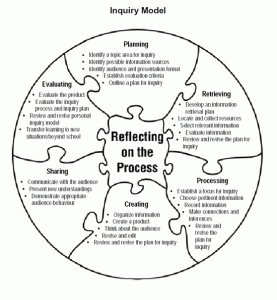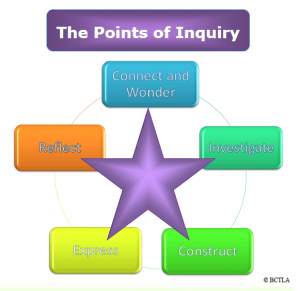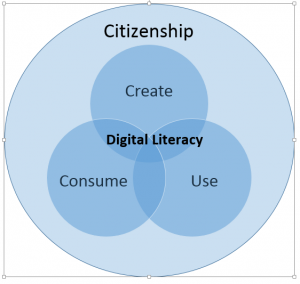Literature Research and Data Collection
A comprehensive “how to” guide for implementing inquiry based learning. Although 133 pages long, this resource offers in-depth support for a teacher attempting inquiry based learning. An inquiry model with six phases is offered: planning, retrieving, processing, creating, sharing, and evaluating. Although ten years old, this document offers an effective research model.
BCTLA offers a more modern version of Alberta’s inquiry model. The Points of Inquiry use the symbol of a star and correspondingly has 5 phases: connect and wonder, investigate, construct, express, and reflect. They have combined Alberta’s “retrieving” and “processing” phases into one: “investigate”. As well, this document uses the lens of information literacy to inform their interpretation of inquiry. That being said, 21st century learning, multiple literacies and technology are also considered, making this a document relevant to digital literacy.
This 10 minute video outlines a yearlong inquiry into inquiry based learning by a Halifax middle school. Specifically, the video looks at a two week thematic unit in which all teachers and students participated. The regular time table was abandoned and students chose teams according to three questions around the importance of food. Student attendance and engagement rose dramatically. As well, the role of the principal / leader and the need to honor teachers as learners is discussed.
Galileo Educational Network. (2014). Discipline-based inquiry rubric.
An amazing website for inquiry based learning and teaching. Specifically, the inquiry rubric allows teachers to evaluate their own inquiry based learning designs. Eight essential components to a well-designed inquiry lesson are identified: authenticity, academic rigor, assessment, beyond the school, appropriate use of technology, active exploration, connecting with experts, and elaborated communication.
This short book (84 pages cover to cover) provides an inquiry model for lesson design, research and examples from BC schools. Well thought out and very readable (although text heavy), this resource provides a spiral to represent a proffessional inquiry model in order to emphasize the non-linear nature of the inquiry process. The spirals of inquiry include: focusing, developing a hunch, learning, taking action, checking, and scanning. An effective guide for teachers designing inquiry-based learning that effectively incorporates assessment for learning.
Student Feedback
As well, I just recently surveyed my students as my first attempt at teaching Digital  Literacy 12 has concluded this week with semester change over and I am now preparing to teach it again this second semester. The survey was anonymous and provided invaluable feedback. Click here to see the results. Of interest was students’ desire to communicate more, both within class and with other countries. I wonder if this might provide an interesting focus of inquiry as 70% of students are retaking the class (can take 3 times for 3 separate course credits). As well, I realized how text heavy many of my assignments still are. More growing to do!
Literacy 12 has concluded this week with semester change over and I am now preparing to teach it again this second semester. The survey was anonymous and provided invaluable feedback. Click here to see the results. Of interest was students’ desire to communicate more, both within class and with other countries. I wonder if this might provide an interesting focus of inquiry as 70% of students are retaking the class (can take 3 times for 3 separate course credits). As well, I realized how text heavy many of my assignments still are. More growing to do!


